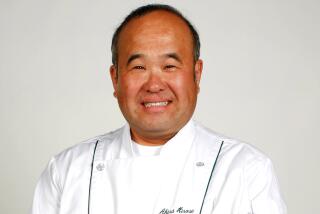Japanese in Corn Country Shuck Their Nostalgia : Cultures: Mitsubishi executives and their families posted to a small town in Illinois find themselves wishing they could stay.
NORMAL, Ill. â Five years ago, Osamu Itoh uprooted his wife and daughter from their home in Tokyo and settled in Americaâs midsection in a town called Normal.
They found it anything but.
After 18 months of dealing with the language barrier, the foreign food, the strange customs and the stress of raising a teen-ager in an unfamiliar land, Itohâs wife, Mariko, summed it all up this way: âvery awful.â
The Itohsâ sentiments were echoed by others among the 50 or so Japanese executives who moved to central Illinois to work at Diamond-Star Motors Corp., a subsidiary of Mitsubishi Motors Corp.
But in the 3 1/2 years that have passed since that initial assessment, many of those workers now have a different view: The Japanese have adapted to corn country. And, though some problems remain, corn country seems to be adapting to them.
âI like the United States so much,â said Mariko Itoh, who says she now dreads a return to Tokyo. âThe people here are so open and friendly. They enjoy life. Itâs so different from Japan.â
The Itohs have settled into a life that includes dinner parties, regular golf outings and American meals--and they are thinking of staying here permanently when Osamu Itoh retires.
âWhen we came here, we could not imagine ever relocating here,â said Itoh, 46, assistant general manager of human resources at Diamond-Star. âNow, I think Iâll work until the mandatory retirement age and then maybe weâd like to come back. Maybe weâll travel from golf course to golf course.â
Takehiko (Mike) Asano felt the same as he prepared to return to company headquarters in Tokyo after a five-year stint as Diamond-Starâs general manager for finance.
âI have considered living in the U.S. after I retire,â said Asano, 50. Of his wife, Hiroko, he said, âLike most Japanese wives in the U.S., sheâd like to stay here.â
The Itohsâ U.S. experience changed from terrible to terrific as their daughter, Urara, now 19, learned to cope with and enjoy American life in this slower-paced college town of 40,000.
Summer camp in Wisconsin helped her overcome the language barrier and make friends. Soon, she was doing well at school and the Itohs were able to enjoy their new surroundings, settling into life with a wide-ranging circle of friends.
âIn Japan, itâs a manâs world,â Mariko Itoh said. âOver there, I am a typical Japanese housewife. I stay home all the time. The men socialize with themselves.
âHere, I have lots of friends. We belong to the country club. Iâve studied golf and Iâm in the golf association and the bowling association. I go to dinner parties with my husband. And thereâs the Chicago Symphony and Broadway shows in New York. Itâs very wonderful.â
Osamu Itoh likes the opportunities the United States offers his daughter.
âThereâs a different attitude here toward women,â he said. âItâs very touchy in Japanese society. There are very few opportunities for ladiesâ promotions in Japanese corporate society.â
But Itoh also wants to get back into the flow of life at Mitsubishi and feels somewhat disconnected from corporate headquarters after living 6,700 miles away for so many years.
Because Urara is attending college in Tokyo this fall to study international relations, he hopes he is transferred back to Japan soon so the family can stay together.
He said heâll have to suppress some of the habits he has developed here, though, such as speaking his mind.
âI love frankly talking to my colleagues,â he said. âIn Japan, there is no appreciation for frankly speaking. I really like to be blunt.â
The $650-million Diamond-Star plant, which opened in November, 1988, is the areaâs second-largest employer and generates about $4 million a year in property taxes.
Recognizing that, the town of Normal has taken steps to make the Japanese more comfortable during their three-to-five-year tours of duty.
A state-funded school, for example, tutors 75 Japanese children every Saturday in Japanese language and culture, mathematics and social studies.
Still, Todd Imahori, who has trained some of Diamond-Starâs 3,100 employees how to cope with cultural differences, thinks the adjustment of the Japanese transplants has been overestimated.
âThere is some tension, and I donât think the Japanese ever really assimilated to life in central Illinois,â said Imahori.
Imahori said the Japanese families in Normal usually spend their weekends among themselves and noted that he ânever heard of any romance springing up between the Japanese and Americans.â
A recent survey by an Illinois Wesleyan economist, however, found that about one in three of 200 residents questioned had had some contact with the Japanese executives or their families.
And in the factory, the melding of cultures has gone smoothly, said Dave Jones, an accountant who worked with Asano.
More to Read
Inside the business of entertainment
The Wide Shot brings you news, analysis and insights on everything from streaming wars to production â and what it all means for the future.
You may occasionally receive promotional content from the Los Angeles Times.








